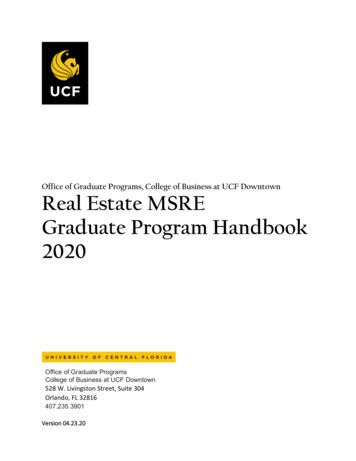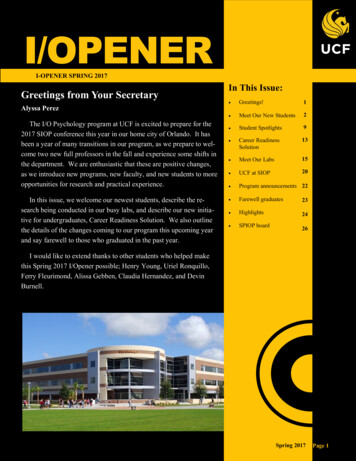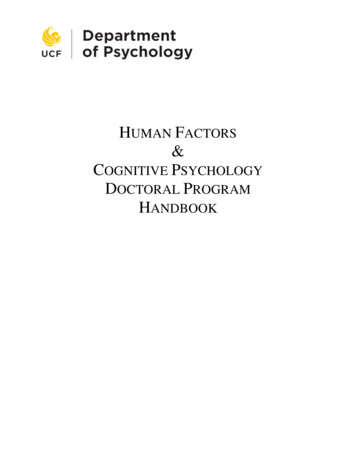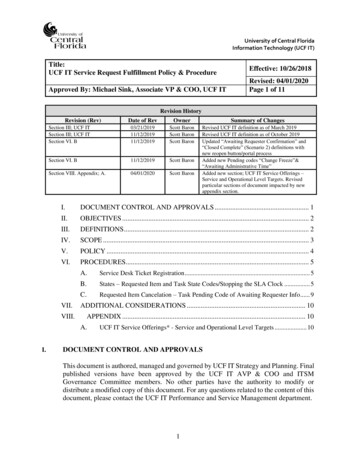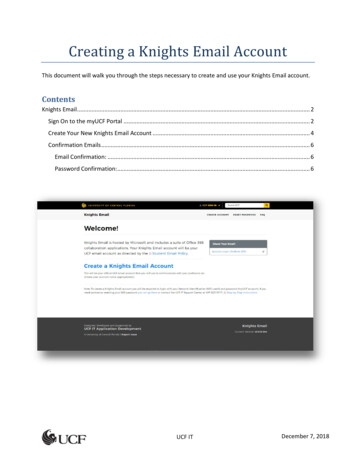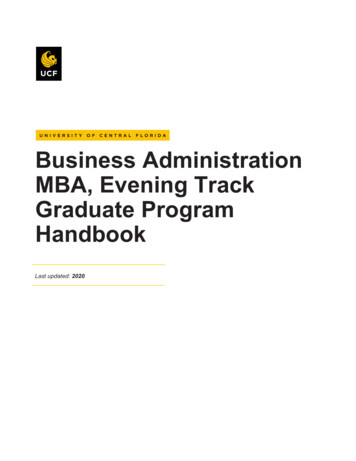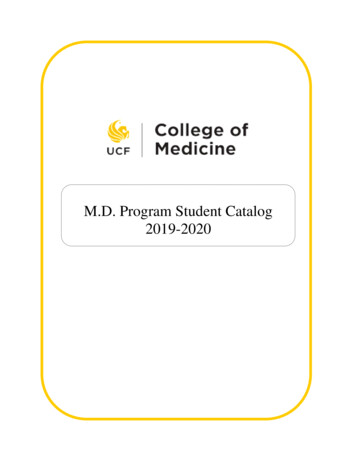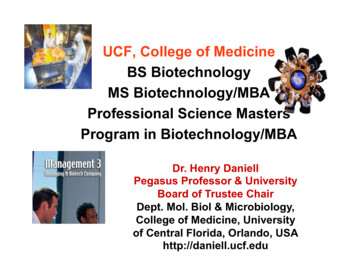
Transcription
UCF, College of MedicineBS BiotechnologyMS Biotechnology/MBAProfessional Science MastersProgram in Biotechnology/MBADr. Henry DaniellPegasus Professor & UniversityBoard of Trustee ChairDept. Mol. Biol & Microbiology,College of Medicine, Universityof Central Florida, Orlando, USAhttp://daniell.ucf.edu
UCF, College of MedicineBiotechnology ProgramsBachelor of ScienceMaster of Science/MBAProfessional Science MS/MBABiotechnology programs will prepare students to function in theindustrial biotechnology environment,and is designed to focus on scientific andpractical aspects of biotechnology.It involves innovative, hands-on, and multidisciplinarylearning approaches to educate and trainstudents in the science behind biotechnology,its business and legal aspects.
UCF Biotechnology Degree Programs Provide students with training, and education in the core aspects ofbiotechnology through hands on and multidisciplinary approach. Scientific principles and knowledge underlying biotechnologicaladvances Laboratory techniques in research and development Legal and intellectual property issues Business and entrepreneurship skills and attributes Students are admitted each Fall. Student can choose to follow one these tracks:MS Biotechnology: thesis (2 years) PSM MS Biotechnology: non-thesis (1 year)MBA – (one year)
Goals of Biotechnology Program To build a world-class academic program to produce highly trainedworkers essential to meeting the workforce needs. To provide a foundation in the life sciences critical to biotechnology. To educate students on how fundamental science is applied to solve problemsthrough biotechnology. To provide students with the technical, laboratory and management skillsneeded in the biotechnology industry. To provide an emphasis on applications and product development critical tothe biotechnology industry. To provide students with an industrial perspective and an understandingof product development. Opportunities to participate in biotechnology graduate research in Collegeof medicine laboratories or internships with industrial partners. To develop team working, communicative, and information fluency skills. To familiarize students with societal concerns, ethical issues andgovernment regulations regarding the biotechnology industry
BIOTECHNOLOGY INDUSTRY FACTS Biotechnology is a 50 billion a year industry that hasproduced 150 drugs and vaccines. There are more than 400 biotech drug products and vaccinescurrently in clinical trials targeting over 200 diseases, includingvarious cancers, Alzheimerʼs, heart disease, AIDS, & diabetes, Biotechnology is responsible for hundreds of medical diagnostictests that keep the blood supply safe. Genetic engineering is sweeping the worldʼs farms. GeneticallyModified crops are grown by millions of farmers in 50 countries Consumers already are enjoying biotechnology foods such assoybeans ( 90% grown in the US) and corn. Hundreds of biopesticides and other agricultural products alsoare being used to improve our food supply and to reduce ourdependence on conventional chemical pesticides.
ADMISSION Admission into the Biotechnology MS programwill require a BS degree in life sciences with aminimum grade point average of 3.0 and totalGRE score of 1000 (combined verbal andquantitative scores). Students entering MS Biotechnology programhave the option to enroll in the MBA programwith no GMAT score. For admission criteria, visitwww.ucfmba.ucf.edu. The MBA program beginseach Fall semester.
Biotech Degree Goals The students will be provided an industrialperspective & an understanding of productdevelopment and the moleculartechniques. Completion of MBA degree in addition toBiotechnology MS will provide greatopportunity to perform jobs that requirescientific talent and management skills.
Bachelors of Science in Biotechnology Upper Division Restricted Electives(Minimum 6-8 hrs)– Choose between 2 to 3 courses from 19courses relevant to the biotechnologyindustry.– MCB 4912 – Directed Research Students must take at least 3 hours of DirectedResearch, which is applied towards their restrictedelectives hours.
MS Biotechnology Required Courses--16 Credit HoursBSC 6407C Laboratory Methods in Molecular Biology (3 credithours)BSC 6432 Structure-Function-Relationships of BiomolecularScience I (5 credit hours)BSC 6432 Structure-Function-Relationships of BiomolecularScience II (5 credit hours)MCB 5527 Genetic Engineering and Biotechnology (3 credit hours)Graduate Seminars--2 Credit HoursStudents will participate in at least two graduate seminar courses(MCB 6938, 1 credit).Seminar course will prepare students for making professionalpresentations with emphasis in biotechnology.Seminar will involve participation of speakers from the biotechnologyindustry with emphasis on an industrial perspective onbiotechnology applications and product development.
Restricted Electives - 6 Credit Hours MCB 5205 Infectious Processes (3 credit hours)MCB 5225 Molecular Biology of Disease (3 credit hours)MCB 5505 Molecular Virology (3 credit hours)MCB 5654 Applied Microbiology (3 credit hours)MCB 5932 Current Topics in Molecular Biology (3 credit hours)MCB 6226 Molecular Diagnostics (3 credit hours)MCB 6417C Microbial Metabolism (3 credit hours)MCB 6938 Seminar (1-2 credit hours)PCB 5238 Immunobiology (3 credit hours)PCB 5239 Tumor Biology (3 credit hours)PCB 5275 Signal Transduction Mechanisms (3 credit hours)PCB 5937 Special Topics: Human Endocrinology (3 credit hours)PCB 6528 Plant Molecular Biology (3 credit hours)PCB 6596 Bioinformation and Genomics (3 credit hours)ZOO 5745C Essentials of Neuroanatomy (4 credit hours)
Thesis- 6 Credit Hours Students will take a minimum of six credits of thesis research (MCB 6971)to complete their research and submit their thesis specializing inbiotechnology research. During the first few weeks students are expected to familiarize themselveswith the research programs by direct interaction with faculty members,through attending seminars or by visiting faculty websites, before choosinga laboratory for thesis research. There will be no laboratory rotation. Students will start their research onSeptember 1 the first fall semester. The student and the Thesis Adviser/Major Professor will jointly recommend an advisory committee comprised ofat least three members. The committee composition must reflect expertise relevant to the studentʼsthesis research and be approved by the Graduate Committee. An oral thesis defense is required. Completion of publication qualityresearch is expected for graduation.
PSM MS Biotechnology No thesis research required Students will take a minimum of six credits ofinternship in companies or research institutions Internship is performed during the summer For PSM certification, MBA foundation courses(4) are required For MBA, profession core is required Both degrees are completed within two years
PSM MS - Biotechnology––– Chemistry CHM 2045, 2046, 2046L Chemistry I & II plus Lab CHM 2210, 2211, 2211L Organic Chemistry I & II plus Lab BCH 4053 Biochemistry IMath and Statistics MAC 2253 or 2311 Calculus I STA 2023 Statistics IPhysics PHY 2053C, 2054C or PHY 2048, 2049 Physics I &IIUpper Division Restricted Electives (Minimum 6-8 hrs)– Choose between 2 to 3 courses from 19 courses relevant to the biotechnology industry.– MCB 4912 – Directed Research Students must take at least 3 hours of Directed Research, which is applied towardstheir restricted electives hours.
Biotech Company Genesis/TimelineStaffing Needs
Steps to Success
Biotech & Biofuels –Way of the Future
U.S. JobOpportunities inBiotech The biotechnology industry has grown over thepast few years, increasing in size between 1993( 8 billion in revenues) to 2003 ( 39 billion inrevenues). U.S. Department of Labor Statistics: thebiotechnology industry employed 815,000individuals in 2007. Biotechnology industry in the United Statescould employ five times the current number ofworkers by 2015. (BLS)
Job Opportunitiesin Florida Currently, Floridaʼs biotechnology industry employs 29,000 people. FL has more than 600 medical, pharmaceutical & biotech. companies State has attracted new biotechnology companies – Scripps, Max Planck,Burnham Institutes, Oregon Health. etc This clustering effect is expected to add 40,000 jobs to Florida. A report in Florida Trends Business Journal – 2007- “Florida has crackedErnst & Young's top 10 list for number of biotech companies. WorkForce Florida states non Ph.D jobs are generally filled by in statecandidates. .pdf) Central Florida: Burhnam Insititue, the new V.A. Hospital, the UCF MedicalSchool, and the ensuing spinoffs and convergence of biotech companies.
Biotech Industry Facts Environmental biotechnology products make it possible toclean up hazardous waste efficiently by harnessing pollutioneating microbes without the use of caustic chemicals. Industrial biotechnology applications have led to cleanerprocesses in industrial sectors as chemicals, pulp and paper,textiles, food, energy, and metals and minerals. For example,most laundry detergents produced in the United Statescontain biotechnology-based enzymes. DNA fingerprinting, a biotech process, has dramaticallyimproved criminal investigation and forensic medicine, as wellas afforded significant advances in anthropology and wildlifemanagement. There are 1,473 biotechnology companies in the U.S.
Biotech Industry Facts: U.S. revenues increased from 8 billion in 1992 to 79.2billion in 2007. The U.S. biotechnology industry employed 258,700people as of Dec. 31, 2007. Biotechnology is one of the most research-intensiveindustries in the world. The top eight biotech companies spent an average of 108,000 per employee on R&D in 2005. The biotech industry is regulated by the U.S. Food andDrug Administration, the Environmental ProtectionAgency, and the Department of Agriculture (USDA).
Thank youfor your attendanceFor more information regardingthe Bachelors of Science orMS in Biotechnology,please contact:Office of Student Servicesand Advisement,HPA II 335,(407)823-5932,bcbsinfo@mail.ucf.edu
Sep 13, 2012 · UCF Biotechnology Degree Programs Provide students with training, and education in the core aspects of biotechnology through hands on and multidisciplinary approach. Scientific principles and knowledge underlying biotechnological advances Laboratory techniques in research

